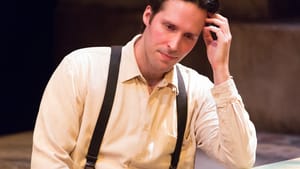Stay in the Loop
BSR publishes on a weekly schedule, with an email newsletter every Wednesday and Thursday morning. There’s no paywall, and subscribing is always free.
A man untransformed
'Oscar Wilde: From the Depths' at the Lantern (first review)

For Wilde fans, Charles McMahon’s Oscar Wilde: From the Depths at the Lantern offers little new insight into the life of one of the greatest creators of English comedy. Although McMahon cleverly juxtaposes dramatic highlights of Wilde’s life as the great writer languishes in Reading Gaol, the play rarely travels outside the scope of standard Wilde bio-epics. These events are worth retelling, but anyone who has studied Wilde’s life knows that underneath the standard story, there’s another begging to be told.
Instead, McMahon stays with the well-known facts, beginning the play after Wilde’s 1895 arrest and trial. The charges stemmed from his relationship with Lord Alfred Douglas (Bosie), whose father, the infamous Marquess of Queensberry, accused Wilde of “posing as a sodomite”; in response, Wilde charged Queensberry with libel. What should have been a procedural trial U-turns into a scandalous X-ray of Wilde’s London sexual exploits with large numbers of London boys. Seeing disaster on the horizon, Wilde’s friends urged him to escape to the United States or Paris, but Wilde stubbornly refused, which sealed his fate. He was convicted of gross indecency and was sentenced to two years’ hard labor despite his claims of innocence.
In this production, the cast of three includes Marc LeVasseur as Wilde; David Bardeen as Robbie Ross, his friend and literary executor; and Jered McLenigan as Lord Alfred Douglas. Bardeen and McLenigan, both superb actors, also take turns playing prison guards and various friends of Wilde.
LeVasseur as Wilde comes across as an actor playing a role; he never really becomes the playwright. Perhaps this is nothing more than LeVasseur’s natural athleticism, which at times borders on the hypermasculine. It’s unfortunate that a daring acting coach did not suggest that LeVasseur spend time investigating the love that dare not speak its name.
Poetry and spirituality
In Act II, the imprisoned Wilde begins to speak extemporaneously in verse, Wilde’s endless repetition of facile verses about beauty and art seem more suited to the drawing room than a dark prison cell. McMahon’s script avoids the deeper layers of a spiritual struggle (and a breakthrough transformation) despite its emphasis on the torturous physical punishments that Wilde had to endure, like working a treadmill and the hours spent unraveling the fibers of hempen ropes from old navy ships.
Act II’s belabored feeling is compounded by Wilde’s continued versifying about irrelevant abstractions. These poetic rants very soon become a kind of verbal treadmill. Audience members snoozed and showed visible signs of boredom until relief was provided in the form of a reprimand from Bosie, who finally told Wilde to stop “the drivel.” Bosie was obviously reading the audience’s mind — but it’s unclear why the drivel was even necessary in the first place, unless of course it was to avoid telling the other Wilde story that begs to be told.
All of this hints at a spiritual transformation about to take place — although this transformation never occurs. According to Joseph Pearce, author of The Unmasking of Oscar Wilde, Wilde twice attempted to convert to Catholicism as a young man, but he didn’t follow through because he feared his father’s reaction.
Although celebrated as a gay icon today, Wilde never felt comfortable with his homosexuality. He certainly never came out of the closet, and in fact he often called his homosexuality a pathology. Pearce also writes that after his time in Reading Gaol, Wilde told a reporter that if his father hadn’t kept him from becoming Catholic, he “would have entered the Church earlier and spared himself his descent into homosexuality.” Wilde, of course, finally converted on his deathbed, suggesting that he repented of his sexual sins.
Now, If only McMahon had turned the transformative aspects of Act II into something approximating the truth, we would have gotten a more substantive portrait of Oscar Wilde. While that portrait may have upset Wilde’s “gay icon” status and annoyed many, at least it would have been a true and honest one.
For Naomi Orwin's review, click here.
What, When, Where
Oscar Wilde: From the Depths. By Charles McMahon. M. Craig Getting directed. Through February 14, 2016 at the Lantern Theater Company at St. Stephen’s Theater, 10th & Ludlow Streets, Philadelphia. 215-829-0395 or lanterntheater.org.
Sign up for our newsletter
All of the week's new articles, all in one place. Sign up for the free weekly BSR newsletters, and don't miss a conversation.

 Thom Nickels
Thom Nickels